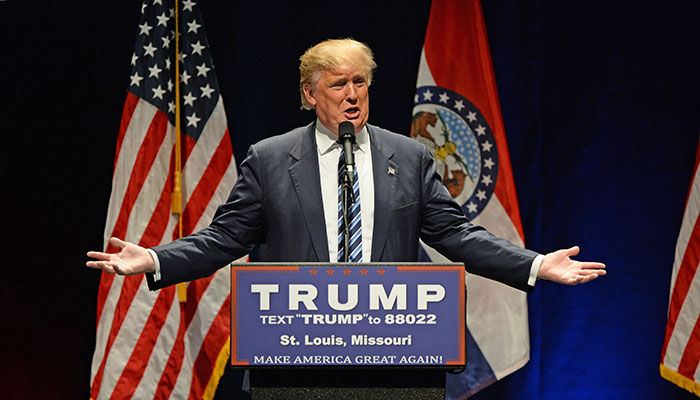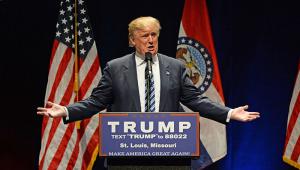web_donaldtrump_shutterstock_389315497.jpg

Donald Trump has won a surprise victory in the US presidential election
The world’s markets are reverting to calm after initially plunging into chaos as investors rushed to sell off assets and flock to safe havens such as gold and the Japanese yen.
Initial market turbulence was akin to (but still less than) that seen in the wake of Britain’s vote to leave the European Union, but has been soothed by Trump’s victory speech which stressed unity and pledged a substantial fiscal expansion.
“It’s time for America to bind the wounds of division,” Trump told his supporters in New York today.
“We have to get together. To all Republicans and Democrats and independents across the nation, I say it is time for us to come together as one united people.
“We are going to fix our inner cities and rebuild our highways, schools and hospitals. We will rebuild our infrastructure,” he said, before pledging to double America’s growth.
A measured and encouraging speech free of the rash vitriol and absurdity that has characterised Trump’s campaign cooled the anxiety that had set in as his victory became increasingly inevitable.
Stock markets, US Treasury bonds and the dollar regained much of their losses and largely recovered from the disarray of the last few hours, with the financial fallout in the end being less dramatic than initially thought.
The Mexican peso, however, was not as fortunate. The currency tumbled over 13.07% – its largest drop since 1994, when a nearly bankrupt Mexico was forced to devalue its currency.
The peso was the hardest hit because of Trump’s threats to quell Mexican immigration by building a “huge wall” along the border and to renegotiate America’s trade agreement with the country.
But markets around the world are all feeling the burn of Trump’s protectionist rhetoric. Stock markets worldwide have been marked down by an average of 5%.
Léon Cornelissen, chief economist at asset management firm Robeco, said world trade and global growth are the two things “really at risk” in the aftermath of the result.
“It’s a historic day – the biggest political upset in American history. It’s clear that US voters have chosen a candidate preaching disruption and have scoffed at continuity. It can be seen as a massive anti-establishment vote along the same lines as Brexit,” he said.
He predicted increased uncertainty in the markets in coming weeks and “some inflationary fears”, as well as an extension of the European Central Bank’s quantitative easing programme.
But observers have pointed out that the true effect of Trump’s victory will be felt in the long term, and that a restrained victory speech is a poor marker of the way he will behave when he takes up the most powerful office in the world.
The election has seen the Republican party take control of the presidency, the House of Representatives and the Senate – the first time one party has held all three since 2007 – meaning Trump is likely to face little opposition in pursuing his policies.
As well as those already mentioned, these include: building a much stricter immigration system; sweeping tax cuts; rolling back regulation; renegotiating trade agreements and bringing trade cases against China; and an “energy revolution” with support for all forms of energy, including coal and gas, which will be freed from restrictions imposed under Obama.
Trump has previously suggested climate change is a hoax orchestrated by China, making his presidency bad news for a world that had, in the past few weeks, become increasingly hopeful that it could halt catastrophic climate change.
Douglas McWilliams, president of the UK’s Centre for Economics and Business Research, predicted that global growth is likely to be around 0.25-0.5% slower per year from 2018 onwards as a result of creeping protectionism and reduced migration.
He also suggested international relations will sour as countries respond to Trump’s inward-looking policies, defence spending will rise globally and that the result will potentially spill over into upcoming French and German elections.
The US Federal Reserve is likely to delay a rise in interest rates and any boost to growth from lower taxes and Trump’s planned spending spree will not offset the losses resulting from trade restrictions and reduced immigration, he concluded.













